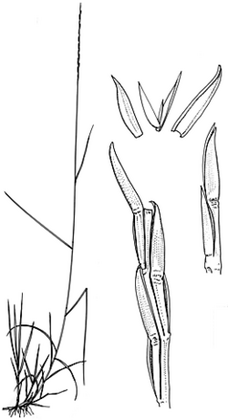Common name: Matgrass
Hemarthria uncinata R.Br. APNI* 
Description: Creeping perennial, sometimes forming mats to 1 m high in damp areas.
Leaves with sheath mostly glabrous; ligule a ciliate rim; blade to 5 mm wide.
Raceme 6–14 cm long, often slightly curved, axillary racemes may form at lower nodes, spikelets falling with rachis internodes. Sessile spikelets 6–10 mm long. Lower glume tapering into a very variable point, acute, acuminate or hooked, faintly 5–7-nerved; upper ± fused to rachis. Lower lemma 2-nerved, sterile, without a palea; upper nerveless, with a small nerveless palea. Pedicellate spikelets 5–10 mm long, often slightly longer and more acuminate than the sessile spikelets. Lower glume similar to that of the sessile spikelet with a straight or hooked apex; upper asymmetric, narrowly winged.
Flowering: summer.
Distribution and occurrence: Grows in swamps or damp places.
NSW subdivisions: NC, CC, SC, NT, CT, ST, NWS, CWS, SWS, SWP
Other Australian states: Qld Vic. Tas. S.A. W.A.
Text by S. W. L. Jacobs & C. A. Wall
Taxon concept:
| | Key to the varieties | |
| 1 | Leaf sheaths closely encircling the stem; pedicellate spikelets usually 5–7 mm long | var. uncinata |
| Leaf sheaths expanded, separated from the stem; pedicellate spikelets mostly 8–10 mm long | var. spathacea |
APNI* Provides a link to the Australian Plant Name Index (hosted by the Australian National Botanic Gardens) for comprehensive bibliographic data
***The AVH map option provides a detailed interactive Australia wide distribution map drawn from collections held by all major Australian herbaria participating in the Australian Virtual Herbarium project.
|


